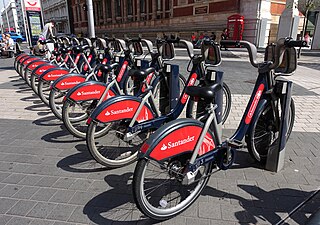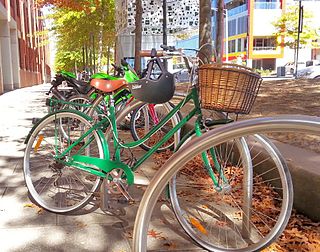
A bicycle, also called a pedal cycle, bike, push-bike or cycle, is a human-powered or motor-assisted, pedal-driven, single-track vehicle, with two wheels attached to a frame, one behind the other. A bicycle rider is called a cyclist, or bicyclist.

Cycling, also known as bicycling or biking, is the activity of riding a bicycle or other type of cycle. It encompasses the use of human-powered vehicles such as balance bikes, unicycles, tricycles, and quadricycles. Cycling is practised around the world for purposes including transport, recreation, exercise, and competitive sport.

Utility cycling encompasses any cycling done simply as a means of transport rather than as a sport or leisure activity. It is the original and most common type of cycling in the world. Cycling mobility is one of the various types of private transport and a major part of individual mobility.
The Royal Society for the Prevention of Accidents (RoSPA) is a British charity that aims to save lives and prevent life-changing injuries which occur as a result of accidents. In the past, it has successfully campaigned on issues of road safety, including playing an integral role in the introduction of drink-drive legislation, the compulsory wearing of seatbelts and the ban on handheld mobile phones while driving, as well as on issues of occupational health and safety.

A bicycle helmet is a type of helmet designed to attenuate impacts to the head of a cyclist in collisions while minimizing side effects such as interference with peripheral vision.

Bicycle safety is the use of road traffic safety practices to reduce risk associated with cycling. Risk can be defined as the number of incidents occurring for a given amount of cycling. Some of this subject matter is hotly debated: for example, which types of cycling environment or cycling infrastructure is safest for cyclists. The merits of obeying the traffic laws and using bicycle lighting at night are less controversial. Wearing a bicycle helmet may reduce the chance of head injury in the event of a crash.
Bikeability is the Department for Transport’s national award provider for cycle training in England. Primarily for children and young people, it is a progressive programme where riders will first master cycle handling skills in motor-traffic-free environments, then develop their skills and confidence to cycle on single-lane roads and simple junctions with mostly moderate motor traffic flows, before tackling busier/ or faster roads, and complex junctions . After completing the training, Bikeability cyclists receive a booklet, a badge and a certificate to recognise training completion. The certificate also identifies areas for further practice as noted by the instructor.

Cycling in Cardiff, capital of Wales, is facilitated by its easy gradients and large parks. In the mid-2000s between 2.7% and 4.3% of people commuted to work by cycling in the city. In 2017 12.4% of workers cycled to work at least 5 days a week. However, cyclists in the city are deterred from cycling by poor facilities and aggressive traffic, according to research by Cardiff University.
Cycling England was an independent body funded by the Department for Transport to promote cycling in England. It was founded in 2005 to replace the National Cycling Strategy Board. Following the 2010 Comprehensive Spending review it was earmarked for abolition, to be replaced by Local Sustainability Travel Funds and new ways of supporting cycling. Cycling England ceased to exist as a public body on 1 April 2011.

Santander Cycles is a public bicycle hire scheme in London in the United Kingdom. The scheme's bicycles are popularly and colloquially known as Boris Bikes, after Boris Johnson who was Mayor of London when the scheme began operating.
Cycling in Australia is a common form of transport, recreation and sport. Many Australians enjoy cycling because it improves their health and reduces road congestion and air pollution. The government has encouraged more people to start, with several state advertising campaigns aimed at increasing safety for those who choose to ride. There is a common perception that riding is a dangerous activity. While it is safer to walk, cycling is a safer method of transport than driving. Cycling is less popular in Australia than in Europe, however cyclists make up one in forty road deaths and one in seven serious injuries.

Some countries and lower jurisdictions have enacted laws or regulations which require cyclists to wear a helmet in certain circumstances, typically when riding on the road or a road-related area. In some places this requirement applies only to children under a certain age, while in others it applies to cyclists of all ages.

Cycling infrastructure is all infrastructure cyclists are allowed to use. Bikeways include bike paths, bike lanes, cycle tracks, rail trails and, where permitted, sidewalks. Roads used by motorists are also cycling infrastructure, except where cyclists are barred such as many freeways/motorways. It includes amenities such as bike racks for parking, shelters, service centers and specialized traffic signs and signals. The more cycling infrastructure, the more people get about by bicycle.

A shared-use path, mixed-use path or multi-use pathway is a path which is "designed to accommodate the movement of pedestrians and cyclists". Examples of shared-use paths include sidewalks designated as shared-use, bridleways and rail trails. A shared-use path typically has a surface that is asphalt, concrete or firmly packed crushed aggregate. Shared-use paths differ from cycle tracks and cycle paths in that shared-use paths are designed to include pedestrians even if the primary anticipated users are cyclists.
One of the potential pitfalls for observers trying to interpret the operation of bikeways is that the same legal assumptions do not apply in all environments. For instance, in contrast to most English speaking countries, some European countries, including Germany, France, Denmark, Belgium, and the Netherlands have defined liability legislation. Thus there is a legal assumption that motorists are automatically considered liable in law for any injuries that occur if they collide with a cyclist. This may hold regardless of any fault on the part of the cyclist and may significantly affect the behaviour of motorists when they encounter cyclists.

Controversies have surrounded dedicated cycling routes in cities. Some critics of bikeways argue that the focus should instead be placed on educating cyclists in road safety, and others that safety is better served by using the road space for parking. There is debate over whether cycle tracks are an effective factor to encourage cycling or whether other factors are at play.

Cycling in the United Kingdom has a long history, since the earliest days of the bicycle, and after a decline in the mid-20th century has been undergoing a resurgence in recent decades.

Cycling in Geelong, Victoria is common for recreation and competition, but less so for utility and commuting.
Rachel Aldred is a British academic specialising in active mobility. She is a Professor in Transport at the University of Westminster and has published over 25 peer-reviewed papers. She was awarded the Economic and Social Research Council's award for Outstanding Impact in Public Policy (2016) for her work on The Near Miss Project, the first UK study calculating a per-mile collision risk for cycling, and is one of the co-investigators of the Propensity to Cycle Tool, an online system for transport planners using census data to model the potential benefits of cycling infrastructure schemes in England, funded by the Department for Transport. Aldred presented to the Transport Select Committee in 2018 as an expert witness during the enquiry into active travel












